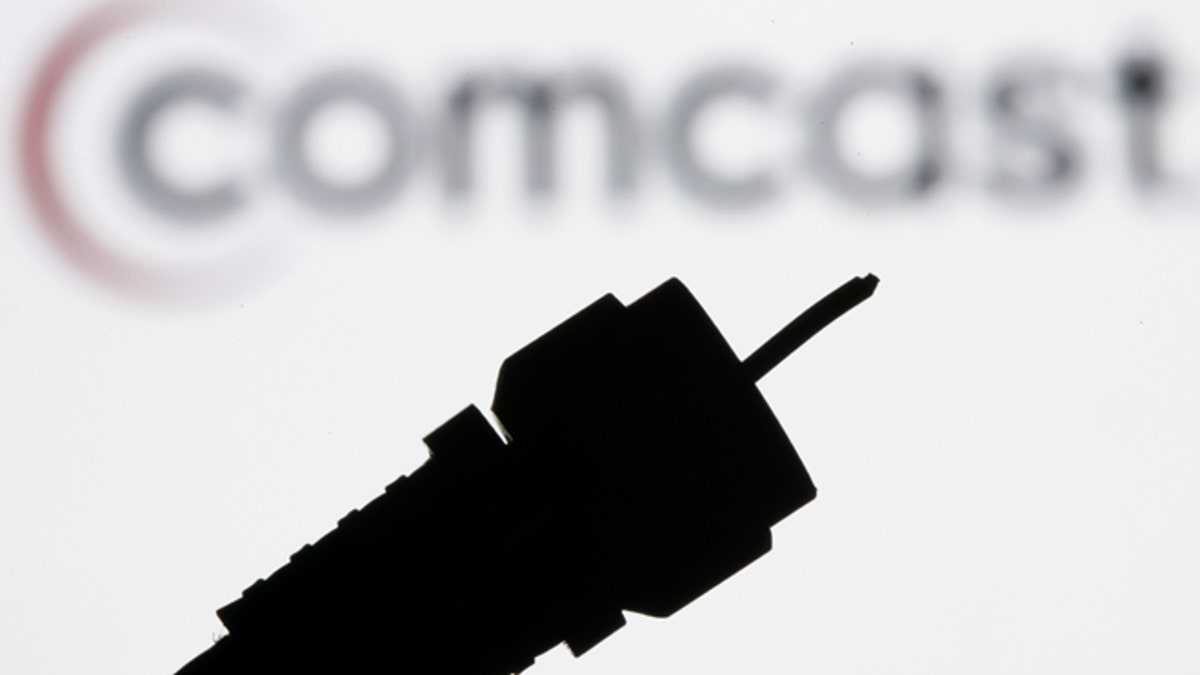
Comcast Corp. announced in February 2014 that it is buying Time Warner Cable Inc. American companies are buying up the competition at levels not seen since the dotcom bubble. (AP Photo/Matt Rourke)
Here we go again. Another major merger, another potentially major wallop to our wallets.
Comcast, the nation's largest cable company, wants to buy Time Warner Cable, the nation's second largest cable company, for $45.2 billion. The proposed merger would scoop up roughly 70 million subscribers, approximately 30 percent of the cable viewers in the U.S. It would also ensnare about 40 percent of all high-speed broadband Internet subscribers in the U.S., effectively controlling what goes over the Web -- and how fast it goes over the Web -- at a time when everything from TVs to washing machines to cars are poised to rely on high-speed Internet connections.
The last time anyone proposed a deal like this that could profoundly affect the communications infrastructure of the U.S. was in 2011, when AT&T tried to merge with T-Mobile. That plan ended in tears (or squeals of joy, depending on your point of view) when the Department of Justice sued to block the deal and AT&T backed down. (Now T-Mobile, which has become the most creative and competitive wireless provider in the U.S., is being stalked by Sprint.) The DOJ argued at the time that the AT&T deal would decrease competition, hurt consumers and squash innovation. The Comcast proposal threatens to do much more, including placing a stranglehold on several growing and changing businesses, such as streaming Internet services and broadcast TV -- not to mention seriously stressing family budgets.
The proposed merger would create a behemoth of a monopoly, crushing networks, broadcasters and any content provider looking for a path.
Granted, cable companies evince about as much sympathy and affection as wireless carriers and the IRS. Bills are high, bundled services are annoying, and when the cable goes out, customers have virtually no alternatives. Satellite TV isn't practical in many urban environments, and it can't adequately replace broadband Internet service.
In the business press, some have argued that two monopolies don't make a wrong. Sure, they say, Comcast and Time Warner are veritable monopolies within their markets, but they are in different markets, so a merger would not affect the competitive landscape.
Nothing could be further from the truth.
The proposed merger would create a behemoth of a monopoly, crushing networks, broadcasters and any content provider looking for a path. With nearly a third of all cable viewers at its command, Comcast could drop stations whenever there was a dispute, not just for part of the country but across the country. For broadcasters it would be like negotiating with a digital Attila the Hun: Surrender or I'll black out your viewers in 19 of the top 20 TV markets in the U.S.
In fact, Comcast has already used its muscle to support its own stations over competitors. The Tennis Channel complained in 2010 that it was discriminated against when it was placed on a higher pay tier (part of those loathsome bundles) while the Comcast-owned Golf Channel was on basic cable, where it would get more viewers. The FCC agreed with the Tennis Channel, but the Supreme Court rejected the complaint last month. (Full disclosure: I'm a tennis fan, not a golf fan, so I feel personally slighted. Maybe the Supremes prefer golf.)
Other broadcasters have had similar problems. The Bloomberg Television channel believed that conditions of Comcast's purchasing NBC Universal meant that Bloomberg would be put in the same neighborhood as Comcast-owned CNBC and MSNBC. But that hasn't happened, and the matter is now before an appeals court.
Of course, broadcasters could move content to the Web to reach viewers. But a merged Comcast-Time Warner would wield even more control over the Net, potentially cutting off the alternative path. Comcast could throttle back certain traffic -- say, a streaming video channel or movies from a competitor -- while keeping its own services at full speed. In fact, even though Comcast has claimed it would not engage in such a practice, Sen. Al Franken (D-Minn.), chairman of the Judiciary Subcommittee for Privacy, Technology and the Law, recently pointed out in a letter to the FCC that Comcast was caught "selectively targeting and interfering" with online competitors.
In other words, goodbye net neutrality. Anyone using a Samsung smart TV or a Roku box could suddenly find his services sputtering. Addicted to your iPad? Don't be surprised to find its videos stuttering because your family’s Wi-Fi network relies on Comcast or Time Warner.
Furthermore, by controlling online access not just in Miami but in other cities like New York, Comcast could more easily raise fees for companies like Netflix that are seeking to get faster direct connections to its networks. Those extra fees would in turn be passed along to customers -- you and me. So a merged cable leader could raise not only its own fees, it could also end up raising the fees we pay to companies like Netflix and Amazon.
All these moves, thanks to the improved "scale" of a massive, merged cable giant, would also discourage so-called “cord cutters,” the generation of people trying to liberate themselves from cable TV service. The cost savings would disappear. And while some disruptive new services, such as Aereo, are seen as threats to cable operators (and broadcasters), they face significant legal hurdles, too.
A better path would be to encourage high-speed Internet competition from the likes of Google and then see what innovations and improvements the cable companies can offer to compete. They should focus on building better services, not bigger deals.








































